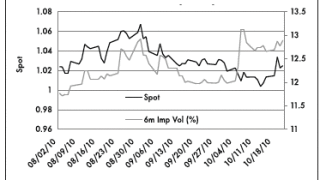Learning Curve
-
Investors published guidelines for interbank market credit risk mitigation instruments Oct. 29, paving the way for the launch of an onshore credit derivatives market in China. This major milestone in the China interbank market marks the beginning of credit derivative product trading in the nascent derivatives market in China.
-
The European Union released its proposal to regulate over-the-counter derivatives Sept. 15, brining to a head the debate about how best to regulate the sovereign credit default swap market. Ensuring the bond and CDS markets operate efficiently and effectively is of concern to all market participants, given the effect widening bond yields might have on the ability of sovereign nations to fund large deficits.
-
In Part I of this Learning Curve we described the impact of Title VII of Dodd-Frank on over-the-counter. Part II explores the clearing regime imposed by the Act, which has centralized clearing as a major component.
-
The full impact of Dodd-Frank on financial markets cannot yet be predicted, but there can be no doubt that the legislation has introduced sweeping changes to the derivatives industry. This Learning Curve focuses on potential changes to the regulatory framework for loan credit default swaps and loan total return swaps and their trading markets as a result of Dodd-Frank. In Part II, we'll discuss the detail of the new clearing requirements.
-
As spreads compress an increasing number of investors, rightly or wrongly, are looking for leverage again.
-
In a joint statement last week, the Chairman of the Commodities and Futures Trading Commission, Gary Gensler and European Commissioner Michel Barnier reaffirmed their determination to co-operate closely in strengthening the global financial system. Based on the European Commission's proposal for regulatory reform of the over-the-counter derivatives market and the Dodd-Frank Wall Street Reform and Consumer Protection Act, Gensler expressed confidence that strong and consistent regulation will be brought to both the European and U.S. swaps markets.
-
Correlation trading through swaps enables one to take a purely systematic correlation view. The fixed side of the swap is based on the implied correlation, which is calculated from the related implied volatilities. The floating side is the final realized correlation of spot returns at expiration (typically 4pm London WMR Fix) using the standard Pearson's correlation. Due to the mean reverting nature of correlations and the fact that they have mathematical and natural type boundaries, the product can create excellent trading opportunities. Other attractive features are asset diversification, zero premium outlay, and efficiency relative to the vanilla option replication.
-
It is an often-quoted truism that when America sneezes Europe catches a cold. The U.S. sneezed with the Dodd-Frank Act in July 2010 and, on Sept. 15 (the second anniversary of Lehman Brother's bankruptcy), the European Commission responded with the publication of its much-anticipated draft legislation for overhauling the OTC derivatives market. Europe, at least for the moment, appears to be in rude health.
-
In the aftermath of the credit crisis, credit spreads soared to unprecedented heights. Basis spreads between three-month Libor and six-month Libor, for example, went from fractions of a basis point (where they had been quoted for decades) to double digits in a matter of months. Practitioners had to revise valuation methodologies to reflect these changes in the market. The accounting profession is now recognizing that these new market practices have important accounting implications as well.
-
The new regulatory framework for over-the-counter derivatives in the Dodd-Frank Wall Street Reform and Consumer Protection Act is designed to overhaul the industry in three primary ways. First, Dodd-Frank aims to substantially reduce systemic risk at both the participant and the product levels. The new law also seeks to structurally deleverage the OTC derivatives markets through the imposition of regulatory capital and margin requirements. Finally, Dodd Frank attempts to bring transparency to the markets through enhanced price discovery, mandatory exchange-trading and required derivatives portfolio disclosures.
-
The Dodd-Frank Wall Street Reform and Consumer Protection Act is perhaps the most far-reaching overhaul of the U.S. financial oversight regime since the 1930's.
-
The financial crisis has resulted in the termination of billions of dollars worth of derivatives between sophisticated market participants.

